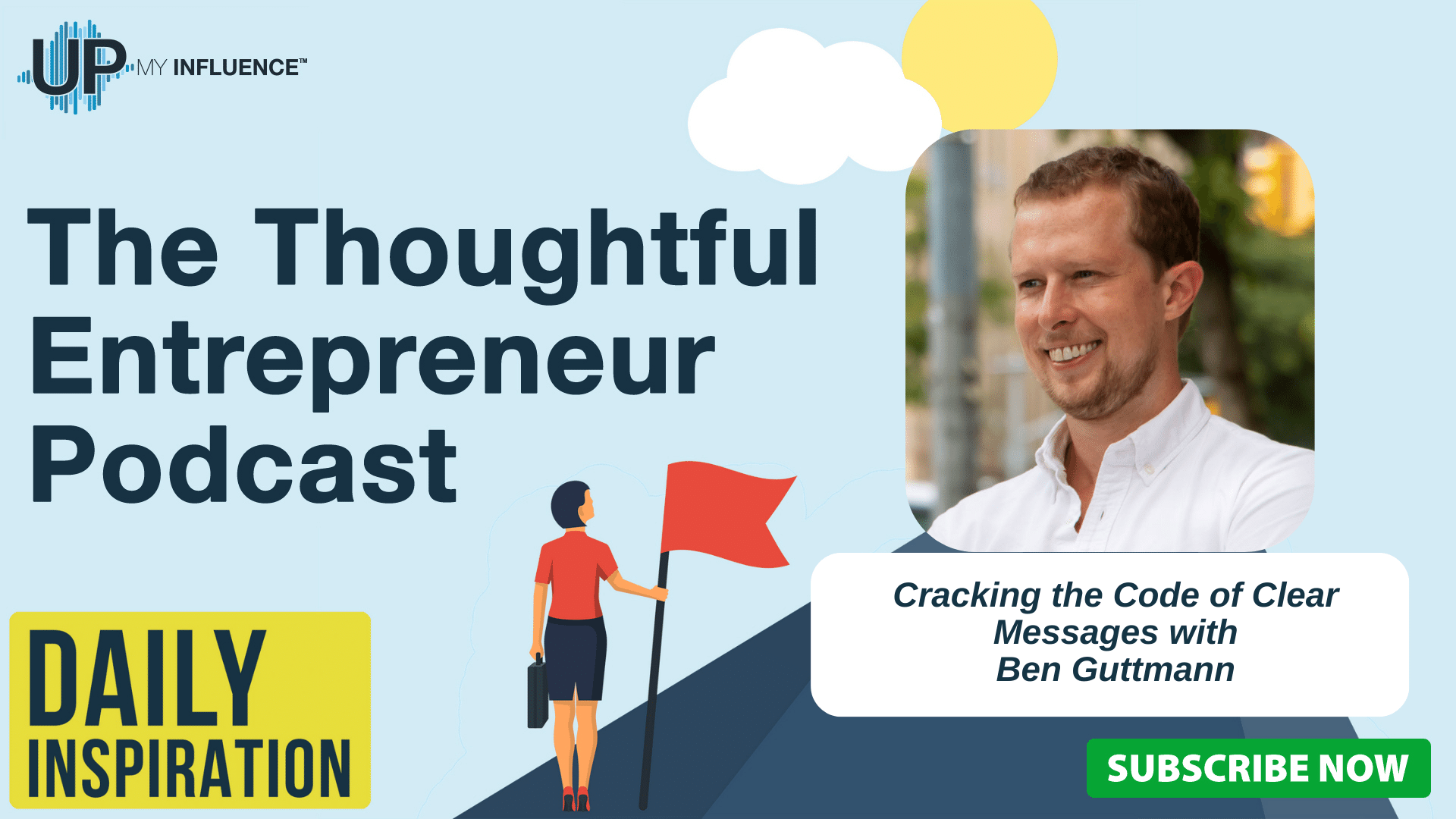THE THOUGHTFUL ENTREPRENEUR PODCAST
In this episode of the Thoughtful Entrepreneur, your host Josh Elledge speaks to Marketing Entrepreneur, Educator, & Author, Ben Guttmann.

In a world filled with constant noise and messaging, Ben emphasized the importance of simplicity. He explained that effective messages are simple and easy to understand. Fluent messages that require less mental load tend to perform better in terms of trust, likability, and buying behavior.
Ben mentioned Apple as a prime example when asked about brands that excel in simple messaging. Apple effectively communicates benefits rather than focusing on features, contrasting with Microsoft's struggles in marketing their Zune product.
He also explored the power of simple messaging in branding and communication. Successful slogans like Apple's “A thousand songs in your pocket” and FedEx's “when it has to Be There Overnight” resonate with customers because they are concise, relatable, and empathetic.
Ben shared a personal story about his dentist, who used a simple and relatable line, “You only have to floss the teeth you want to keep,” which motivated him to start flossing regularly. This example highlights the power of empathy and direct communication in influencing behavior.
Ben offers a wealth of resources on his website, including a weekly email newsletter with exciting ideas and downloads. You can also connect with him on LinkedIn. Ben is a wellspring of knowledge with his experience as a speaker, teaching marketing at Baruch College, and speaking at various meetups, corporations, non-profits, and conferences.
Key Points from the Episode:
- Importance of simplicity in messaging and communication
- Five principles for achieving simplicity in design: benefit to the receiver, focus on one thing at a time, stand out from noise, empathy for the audience, minimalism
- Editing process and conveying the message immediately in book titles and covers
- Examples of brands with simple messaging: Apple vs Microsoft
- Power of simple and straightforward messaging in branding and communication
- Examples of successful slogans
- Application of simple messaging in personal relationships
- The target audience for the book “Simply Put”: leaders, entrepreneurs, advocates, faith leaders
- Resources available on Ben's website: newsletter, downloads, LinkedIn connection
About Ben Guttmann:
Ben Guttmann is a seasoned marketing professional, educator, and author dedicated to unraveling the motivations behind human behavior. With a wealth of experience running a successful marketing agency, teaching at Baruch College, and collaborating with major brands, Guttmann emphasizes the power of simplicity in winning ideas.
Founder of the award-winning marketing agency Digital Natives Group, Guttmann's journey began with local businesses. It evolved into partnerships with notable entities like the NFL, Comcast NBCUniversal, and The Nature Conservancy.
In addition to teaching marketing to aspiring professionals at Baruch College since 2014, Guttmann has contributed to major publications like the New York Times and the Wall Street Journal. He's a sought-after speaker at conferences and events, having organized the successful Queens Tech Night meetup series.
Beyond his professional endeavors, Guttmann has served on the boards of influential organizations such as the Long Island City Partnership and the Queens Economic Development Corporation.
His commitment to exploring new ideas, advising clients, and blending technology with humanity defines his current focus. Guttmann's impactful career underscores the significance of clear and direct messaging in a distracted world.
Tweetable Moments:
3:49 – “Marketing is actually kind of simple. We have the vessel and we have the content. The vessel is all that stuff.”
8:03 – “Nobody is reading your diet book and also knows what you had for breakfast that morning, but they'll read your book about communication and other.”
9:33 – “It's not about what the features are, it's about what the benefits are. The thousand songs in your pocket.”
Apply to be a Guest on The Thoughtful Entrepreneur:
https://go.upmyinfluence.com/podcast-guest
Links Mentioned in this Episode:
Want to learn more? Check out Ben Guttmann website at
Check out Ben Guttmann on LinkedIn at
https://www.linkedin.com/in/benguttmann/
Check out Ben Guttmann on Instagram at
https://www.instagram.com/ben.guttmann/
Don’t forget to subscribe to The Thoughtful Entrepreneur and thank you for listening. Tune in next time!
More from UpMyInfluence:
We are actively booking guests for our The Thoughtful Entrepreneur. Schedule HERE.
Are you a 6-figure consultant? I’ve got high-level intros for you. Learn more here.
What is your #1 Lead Generation BLOCKER? Take my free quiz here.
Want to learn more about all the podcasts managed by UpMyInfluence? Opt in here.

